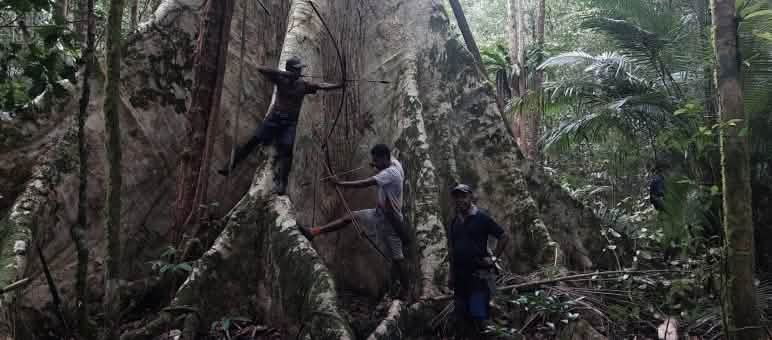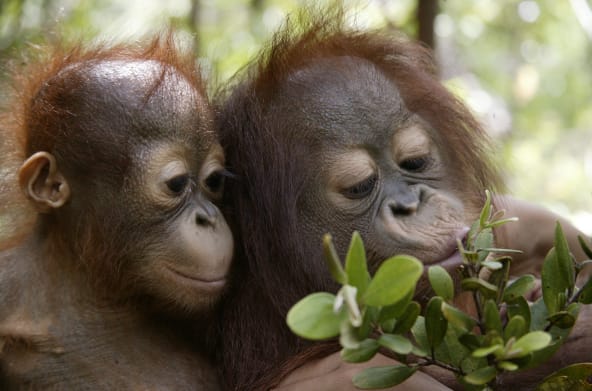
2014: hard-fought successes for the rainforest
Guatemala, Indonesia, Cambodia, Malaysia, Tanzania: Our partners on the ground are moving heaven and earth to preserve the biodiversity of their rainforest homes, and we have their backs with petitions, fundraising and campaigns to raise international awareness. Here are some of the success stories that keep us pushing forward in our work for the rainforests.
Indonesia: environmentalists prevail in court
“We won”, reports Nordin, a member of our partner organization Save our Borneo. “The Indonesian Supreme Court confirmed that the palm oil company Bumitama Agri acted illegally when it cleared 7,000 hectares of primary forest. This verdict shows the impact of our campaigns for the rainforest.” Nordin became aware of the illegal deforestation in March 2012 and filed a complaint.
Hope for Sumatran orangutans
On the Indonesian island of Sumatra, a palm oil company was found guilty of illegal logging: PT Kallista Alam was ordered to pay a fine of $9.4 million, as well as a further $21 million for the reforestation of the Tripa peat forest it had destroyed. The area is the home of the last Sumatran orangutans.
Tasmania’s ancient forests are safe
Together we did it: Australia’s government wanted to strip 74,000 hectares of primary forest in Tasmania of its World Heritage protection. Pandering to the state’s timber industry, Prime Minister Abbott had asserted that the forests were not untouched nature. A worldwide storm of protest prompted the UNESCO to reject Abbott’s bid: the World Heritage Committee needed less than seven minutes to reach a unanimous ruling, in which one delegate described the Australian government’s reasons for the delisting as “feeble”. The 74,000 hectares had only just been placed under protection in 2013 at the request of the previous Australian government. Together with Australian environmentalists, we campaigned for the preservation of the World Heritage site and collected 368,869 signatures worldwide.
Other success stories
We delivered our petition with 83,000 signatures calling for the protection of sea turtles to environmental authorities of the Malaysian state of Perak. The authorities stated that they will review the planned construction of factories in the turtles’ nesting area.
Following worldwide protests, the Australian government is now discussing the protection of koalas. Wood plantations are currently eating into the koalas’ habitat.
In recent years, the resistance of indigenous people has prompted two hydropower companies to drop their plans to build dams in Cambodia’s Areng Valley. Together with environmentalists on the ground and the international support of our petitions, they are now working tirelessly to get the third company in line for the project to abandon its plans. The valley in the Cardamom Mountains is one of the most biodiverse regions in Southeast Asia.
In the Malaysian state of Sarawak on Borneo, the new Chief Minister Adenan Satem is a ray of hope for the state’s rainforests and indigenous Penan people: The new head of government is taking on the powerful timber mafia and has stated that he will no longer tolerate corruption, nepotism and illegal logging. Lukas Straumann of the Bruno Manser Fund, an organization that has been working to protect the forests of Sarawak for many years, said: “These are the clearest words we have ever heard from a leading Malaysian government minister to combat corruption as a root cause of deforestation and under-development.”
A court in Guatemala ruled in favor of indigenous peoples seeking to stop mining multinational Goldcorp from realizing a gold mine on Mayan land.
On the Philippine island of Palawan, resistance against the spread of oil palm plantations is building. With our support, farmers and indigenous people established the Coalition against Land Grabbing as a global platform to disseminate information and denounce crimes against the environment.
The East African Court of Justice halted plans for a paved road through Serengeti National Park that would have caused incalculable damage to the East African ecosystem. In their decision, the judges highlighted the Serengeti’s protected status as a UNESCO World Heritage Site. By building the road, the government of Tanzania would have violated international treaties for the conservation of nature and biodiversity. Plans to expand the road network in the region are still on the table, however, and we will be monitoring developments in the Serengeti closely.
This year, we collected more than three million signatures for 38 petitions and delivered them to the responsible parties. Thank you for being involved!
